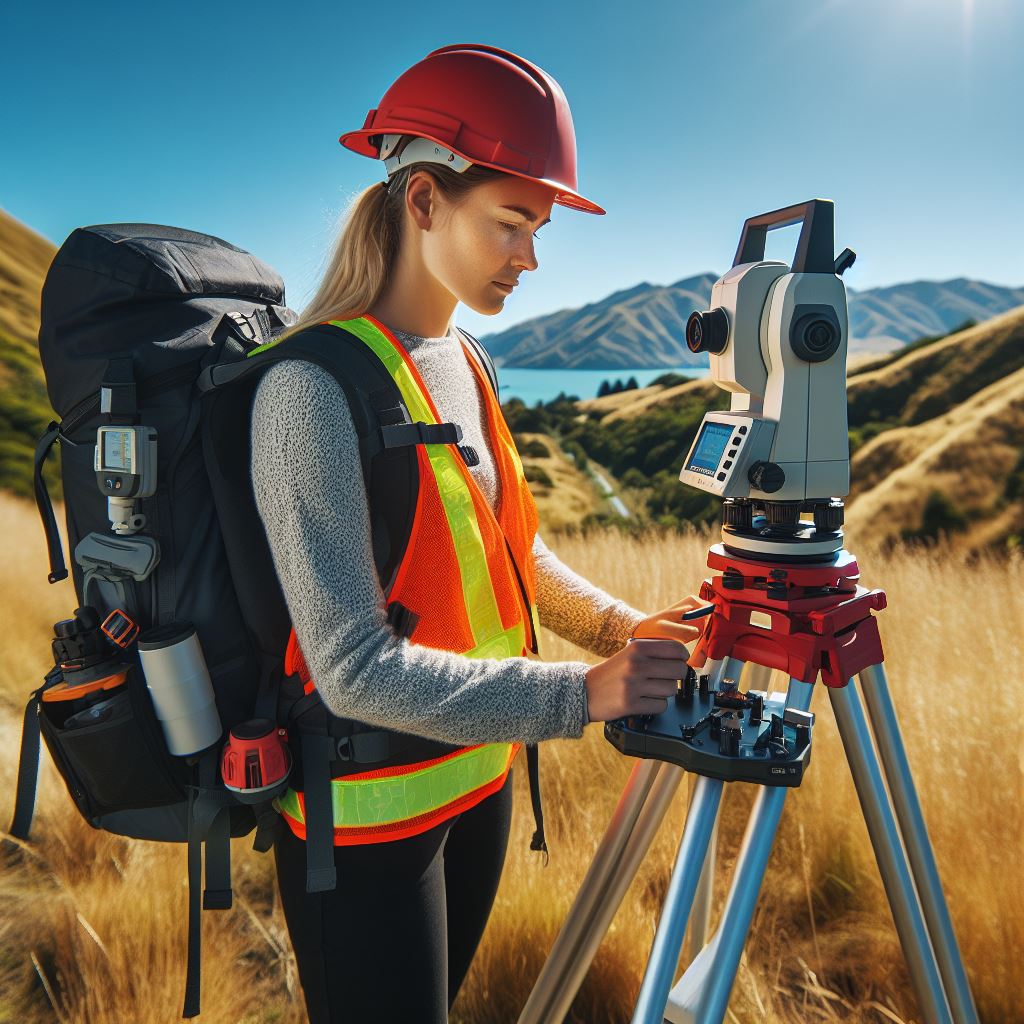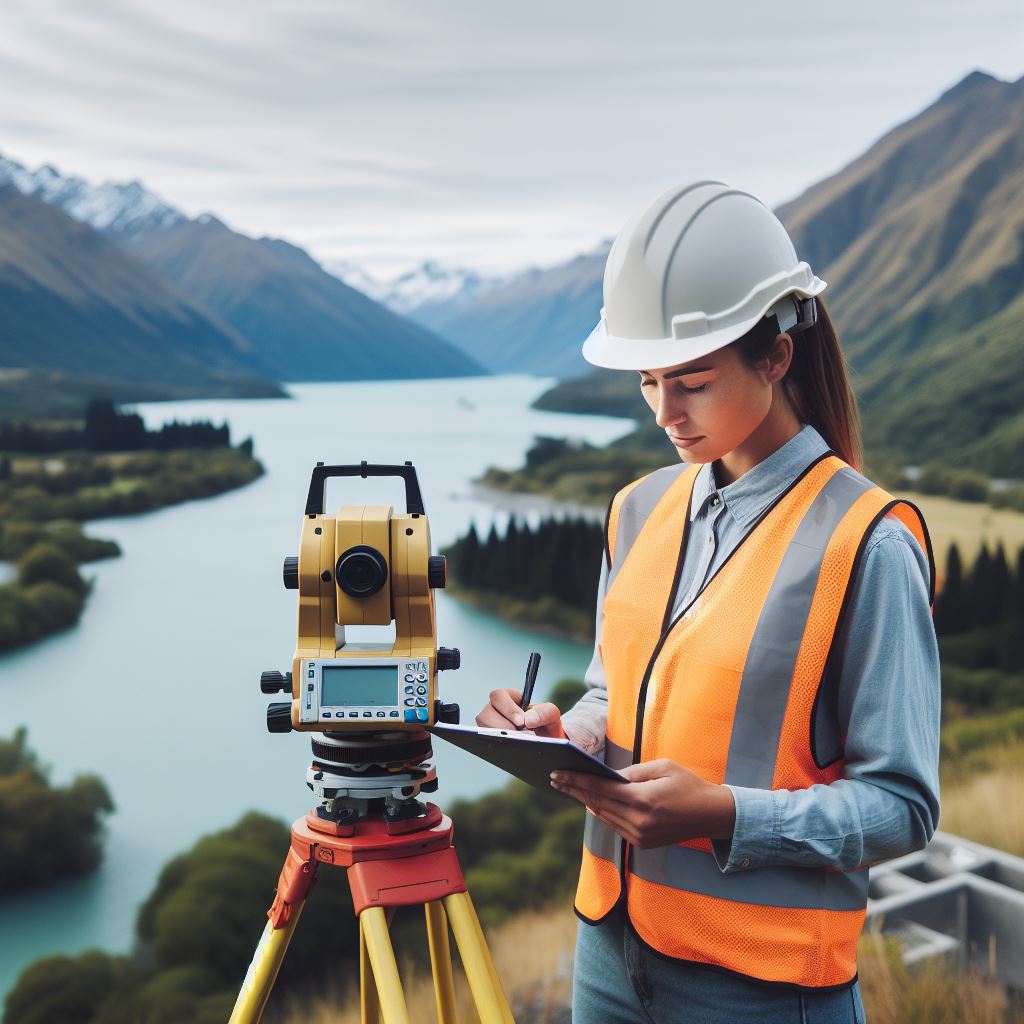Introduction
Navigating New Zealand’s land surveying landscape requires a comprehensive understanding of the laws and regulations governing the profession.
Land surveying plays a crucial role in property development, land management, and infrastructure projects across the country.
To ensure accuracy, integrity, and ethical standards, land surveyors in New Zealand must adhere to a set of laws and regulations.
These regulations encompass various aspects, including licensing requirements, cadastral survey rules, and compliance with national standards.
Understanding these legal frameworks is essential for both aspiring and practicing land surveyors to operate within the boundaries of the law.
In this section, we will explore the key laws and regulations shaping land surveying practices in New Zealand.
From the Surveyor Act to the Cadastral Survey Act, these legal instruments define the rights and responsibilities of land surveyors.
We’ll delve into the licensing process, examining the qualifications and criteria necessary to become a licensed land surveyor in New Zealand.
Additionally, we’ll explore the role of the Surveyor-General and the Surveyors Board in overseeing the profession and ensuring compliance.
As technology evolves, we’ll discuss how advancements impact land surveying practices and may lead to updates in regulations.
Understanding these legal nuances is not only vital for individual surveyors but also contributes to maintaining public trust and upholding the integrity of the profession.
Join us on this exploration of the legal foundations of land surveying in New Zealand, providing valuable insights for professionals and enthusiasts alike.
Overview of Land Surveying Laws and Regulations in NZ
Land surveying is an important aspect of ensuring proper land ownership and boundaries.
In New Zealand, land surveying is governed by a legal framework that includes various laws and regulations.
Understanding these laws is crucial for landowners and professionals in the field.
This blog section provides an overview of the land surveying laws and regulations in New Zealand.
A. The Legal Framework
Land surveying in New Zealand is primarily governed by the Cadastral Survey Act 2002.
This legislation sets out the rules and requirements for conducting land surveys and establishing land boundaries.
The Act outlines the responsibilities of surveyors and the process for registering and recording survey plans.
In addition to the Cadastral Survey Act 2002, there are other relevant laws and regulations that impact land surveying in New Zealand.
These include the Land Transfer Act 2017, which deals with the registration of land titles, and the Resource Management Act 1991, which covers land use and development.
B. The Role of Government Organizations
Land Information New Zealand (LINZ) primarily enforces land surveying laws and regulations in New Zealand.
LINZ manages land information.
They guide and support land surveyors, landowners, and stakeholders in complying with land surveying laws.
LINZ establishes processes and guidelines for surveying practices, ensuring consistency and accuracy.
LINZ registers and certifies surveyors based on specific qualifications and criteria.
They maintain a register of land survey plans accessible to the public.
This register prevents disputes and facilitates land transactions.
LINZ has authority to take actions for non-compliance, including warnings, fines, or registration revocation.
Enforcement measures maintain standards and credibility in land surveying.
Land surveying laws provide guidelines for survey accuracy and integrity.
The Cadastral Survey Act 2002 and related legislation govern land surveys.
LINZ’s role in enforcement ensures professionalism in land surveying.
Understanding and compliance with these laws is essential for all involved in land transactions.
Read: Essential Skills for NZ’s Electrical Engineers
Qualifications and Licensing Requirements for Land Surveyors in NZ
A. Qualifications and certifications necessary to become a licensed land surveyor in NZ
In order to become a licensed land surveyor in New Zealand, individuals must meet several qualifications and certifications:
- Educational Requirements: Prospective land surveyors must possess a Bachelor’s degree in surveying or a related field.
- Professional Examinations: After completing the required education, candidates must pass the New Zealand Board of Surveyors’ professional examinations.
- Licensing Process: Once the examinations are successfully cleared, individuals can apply for a license.
It should be noted that to maintain their license, land surveyors are required to participate in ongoing training and renewal processes:
- Continuing Professional Development: Licensed land surveyors must engage in ongoing training to stay up-to-date with the latest laws, techniques, and technologies in the field.
- Renewal Requirements: Every year, surveyors must renew their license by fulfilling certain criteria, such as completing a specific number of continuing education hours.
- Code of Conduct: Surveyors are expected to adhere to a code of conduct that upholds professional ethics and standards in their practice.
Obtaining the necessary qualifications and licensing demonstrates a land surveyor’s competence and ensures they meet the required standards in the industry.
The stringent requirements aim to safeguard the integrity and accuracy of land surveying operations in New Zealand.
B. Educational requirements and professional examinations
By specifying educational prerequisites, the profession ensures that surveyors have the fundamental knowledge and skills in surveying techniques, land law, and geospatial technologies.
This ensures clients and the public can rely on their expertise to accurately determine property boundaries, create legal documents, and provide technical advice.
The professional examinations administered by the New Zealand Board of Surveyors are comprehensive assessments that cover various aspects of surveying.
By successfully passing these exams, surveyors demonstrate their proficiency in areas such as cadastral surveying, geodetic surveying, and resource management.
However, the requirements don’t stop at obtaining a license. To remain licensed, surveyors must actively participate in continuing professional development.
This ensures that surveyors are aware of advancements in surveying methodologies, technological developments, and changes to legal or regulatory frameworks.
Personalized Career Consulting
Unlock your potential with expert career advice tailored to your goals. Get personalized guidance and actionable steps toward your dream career in New Zealand.
Get StartedC. Overview of ongoing training and renewal requirements
Furthermore, the annual license renewal process reinforces the commitment to ongoing professional development.
By requiring a certain number of continuing education hours, the system encourages surveyors to continuously expand their knowledge and skills throughout their careers.
The code of conduct for land surveyors establishes the ethical framework within which they operate.
It outlines the professional responsibilities and behaviors expected from surveyors, promoting accountability and maintaining trust in the profession.
Adherence to the code helps ensure that land surveying services are carried out with integrity and professionalism.
Therefore, becoming a licensed land surveyor in New Zealand entails meeting rigorous qualifications and licensing requirements.
Read: Interview: NZ Electrical Engineers’ Success Stories
Scope of Land Surveying Work
A. Different types of land surveys conducted in NZ
Land surveying in New Zealand encompasses various types of surveys, each serving a specific purpose.
These surveys play a crucial role in ensuring accurate land measurements and boundary identification.
Here are some of the common types of land surveys conducted in NZ:
- Cadastral Surveys: Cadastral surveys are the most common type of land survey conducted in NZ.
These surveys are used to establish property boundaries, mark land parcels, and maintain the land register system. - Boundary Surveys: Boundary surveys are performed to ascertain and identify the exact location of property boundaries.
These surveys help to resolve any disputes or discrepancies related to land boundaries. - Topographic Surveys: Topographic surveys involve mapping the physical features of a piece of land, including its elevation, contours, natural and man-made features.
These surveys provide valuable information for urban planning, engineering projects, and land development. - Construction Surveys: Construction surveys are conducted to establish reference points and layout the position of structures, roads, and utilities during the construction phase.
These surveys ensure the accurate implementation of architectural plans. - Engineering Surveys: Engineering surveys involve the measurement and mapping of existing man-made structures, such as bridges, tunnels, and dams.
These surveys help in the design and maintenance of infrastructure projects.
B. Cadastral surveys and their role in land register systems
Cadastral surveys play a vital role in maintaining the land register system in NZ.
These surveys are conducted by licensed land surveyors who are authorized to measure and define land boundaries in accordance with legal requirements.
The main purpose of cadastral surveys is to establish and protect real property rights.
These surveys determine the boundaries of land parcels, mark the position of cadastral marks, and create new boundaries when necessary.
The information obtained from cadastral surveys is used to create and update the land register system.
The land register provides crucial details about land ownership, legal boundaries, and any encumbrances or restrictions on the land.
Cadastral surveys also facilitate property transactions, as accurate boundary identification is crucial during land sales, subdivisions, or easement applications.
These surveys help prevent potential boundary disputes and ensure fair and transparent land transactions.
C. Other surveying services offered
In addition to cadastral surveys, land surveyors in NZ also provide other essential surveying services:
- Boundary Surveys: As mentioned earlier, boundary surveys are conducted to determine property boundaries, resolve boundary-related disputes, and assist in land transactions.
- Topographic Surveys: Topographic surveys accurately map the physical features of a particular area, providing detailed information about the terrain, elevation, and vegetation.
These surveys aid in land development, environmental planning, and infrastructure projects. - Geodetic Surveys: Geodetic surveys involve the measurement and precise positioning of points on the Earth’s surface.
These surveys contribute to the establishment of accurate geospatial reference frameworks for various applications, including navigation, mapping, and scientific research. - Monitoring Surveys: Monitoring surveys are conducted to track and document any changes or movements in structures, such as buildings, bridges, or landfills.
These surveys help in assessing the stability and safety of these structures over time.
Overall, land surveying in NZ encompasses a broad range of survey types, each serving a specific purpose.
Whether it is establishing property boundaries, mapping physical features, or providing geospatial reference, land surveyors play a crucial role in ensuring accurate and reliable land information.
Read: Women in Electrical Engineering in NZ

Professional Ethics and Conduct
A. Ethical considerations for land surveyors in NZ
- Surveyors in NZ have a professional duty to act with integrity and honesty.
- They must prioritize the public interest and continuously develop their skills and knowledge.
- Surveyors are expected to maintain confidentiality and avoid conflicts of interest.
- They should communicate effectively and provide accurate and reliable information to clients.
- Professional conduct requires surveyors to comply with all relevant laws and regulations.
- Surveyors must also be honest in billing, provide fair fees, and avoid financial misconduct.
B. Duty of surveyors to maintain accuracy and integrity
- Surveyors have a crucial responsibility to ensure the accuracy of their measurements and data.
- They should use appropriate surveying techniques and equipment to minimize errors.
- Maintaining the integrity of survey data helps in preventing disputes and legal issues.
- Surveyors should establish clear property boundaries and avoid ambiguous or conflicting information.
- By maintaining accuracy and integrity, surveyors build trust and credibility in their profession.
C. Consequences of unethical conduct and the role of disciplinary boards
- Unethical conduct by surveyors can have severe consequences, including damage to their professional reputation.
- Clients may lose trust in their services, leading to loss of business and potential legal repercussions.
- Disciplinary boards play a significant role in ensuring ethical conduct among surveyors in NZ.
- These boards have the authority to investigate complaints and take appropriate disciplinary actions against unethical surveyors.
- Possible consequences can include license revocation, fines, and limitations on future practice.
Professional ethics and conduct are essential considerations for land surveyors in NZ.
Transform Your Career with a Professional CV and Cover Letter
Stand out to employers with an ATS-optimized resume and tailored cover letter designed to match your dream role. Let us craft your job application materials for success!
Get StartedSurveyors must prioritize integrity, accuracy, and the public interest to maintain their professional reputation.
Unethical behavior can lead to severe consequences and the involvement of disciplinary boards.
By upholding ethical standards, surveyors contribute to the reliability and credibility of the land surveying profession.
Read: Salary Guide: Electrical Engineers in NZ
Challenges and Limitations
A. Challenges faced by land surveyors in NZ
- Varied terrain and diverse landscapes pose challenges for accurate measurements and mapping.
- Unpredictable weather conditions can hinder surveying activities, especially in remote or mountainous areas.
- Access to private properties and obtaining permissions can be difficult, causing delays and obstacles.
- Navigating through dense forests, rivers, or water bodies can make surveying arduous and time-consuming.
- Dealing with indigenous land rights and cultural sensitivities requires surveyors to be knowledgeable and respectful.
- Working in hazardous environments such as mining sites or construction zones can be dangerous.
- Maintaining accuracy and precision in measurements is crucial, as errors can lead to significant consequences.
- Challenges in interpreting historical records or cadastral boundaries can complicate surveying tasks.
- Keeping up with technological advancements and training staff on new tools and equipment.
- Meeting tight deadlines and client expectations while ensuring quality work can be challenging.
B. Limitations of land surveying techniques and technologies
- Traditional surveying methods like tape measuring can be time-consuming, less accurate, and limited by line-of-sight.
- The use of GPS technology can be affected by signal interference or obstructions, compromising accuracy.
- GIS software and data analysis techniques may require specialized training and expertise.
- Dependence on satellite imagery may not provide precise details necessary for certain types of surveys.
- Boundary disputes and competing claims can be complex to resolve due to limitations in surveying techniques.
- Limitations in laser scanning technology may make it difficult to capture intricate details or small objects.
- Surveying underwater areas or submerged lands can be challenging due to limited visibility and access.
- The cost of high-end surveying equipment can be prohibitive for small-scale surveying businesses.
- Technical issues and software glitches can affect the reliability and efficiency of surveying workflows.
- Interpreting and communicating survey results accurately to non-technical stakeholders can be challenging.
C. Potential legal or regulatory issues affecting the profession
- Changes in land tenure laws and regulations can affect the scope of surveying activities and professional responsibilities.
- Compliance with environmental regulations and restrictions may limit surveying in ecologically sensitive areas.
- Legal disputes over land boundaries or ownership can require surveyors to provide expert testimony in court.
- Adherence to privacy laws when surveying private properties and handling sensitive data.
- Ensuring ethical conduct and professional standards in the face of potential conflicts of interest.
- Keeping up-to-date with changes in legislation and regulations to maintain compliance.
- Potential liability issues arising from errors or inaccuracies in surveying results.
- Regulations surrounding the use of drones, especially in urban areas or near airports.
- Ensuring the confidentiality and security of survey data and preventing unauthorized access.
- Implications of indigenous land rights and the need for consultation and collaboration with local communities.
Conclusion
A. Recap the main points discussed in the blog post
In this blog post, we have discussed the laws and regulations surrounding land surveying in New Zealand.
We explored the importance of these rules to ensure accuracy and legal compliance in the field.
B. Significance of laws and regulations in land surveying
The regulations in place govern various aspects of land surveying, including licensing requirements, standards of practice, and the protection of property rights.
These laws aim to uphold professionalism and maintain the integrity of surveying activities.
Anyone involved in land surveying in New Zealand must comply with these crucial regulations.
By following the laws, surveyors can provide reliable and accurate data and avoid potential legal issues.
C. Encouraging readers to further explore the field and its legal aspects
Individuals interested in land surveying must explore the legal aspects of the profession further.
Enhancing knowledge and skills prepares them to adhere to laws and regulations governing land surveying.
In closing, laws and regulations play a significant role in land surveying in New Zealand.
They provide a framework for surveyors to operate within, ensuring accuracy, fairness, and legal compliance.
It is imperative for professionals in this field to stay updated with any changes in legislation and actively engage in ongoing learning and professional development.
By doing so, they contribute to maintaining the integrity of the land surveying industry and protecting the rights of individuals and landowners.




